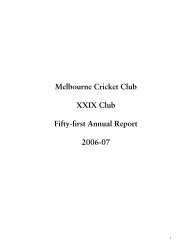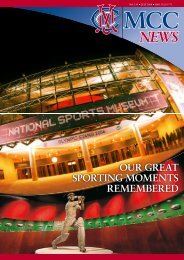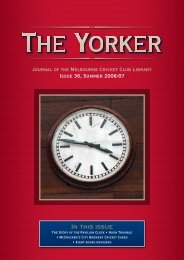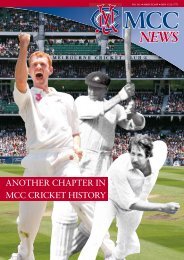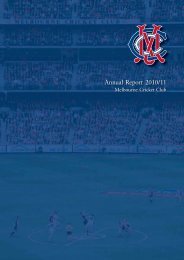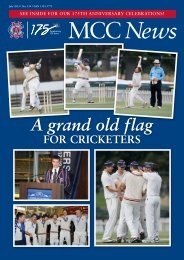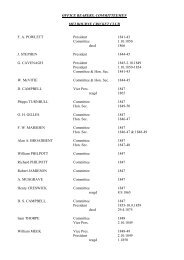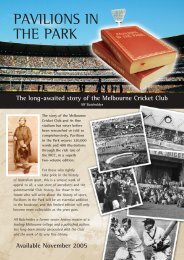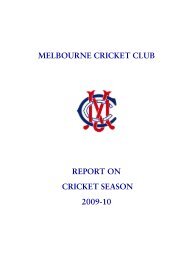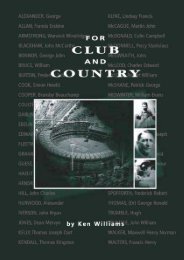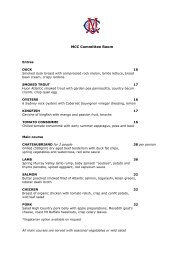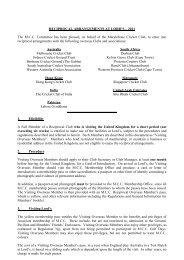Issue 42: Spring 2010 - Melbourne Cricket Club
Issue 42: Spring 2010 - Melbourne Cricket Club
Issue 42: Spring 2010 - Melbourne Cricket Club
Create successful ePaper yourself
Turn your PDF publications into a flip-book with our unique Google optimized e-Paper software.
The 1917<br />
Patriotic<br />
Carnival<br />
On August 5, 1914, "a dull, damp day, with conditions all<br />
against good football", Xavier played <strong>Melbourne</strong> Grammar at<br />
the MCG. As newspapers arrived announcing that Australia<br />
was at war, boys read silently in the rain, wondering what it all<br />
might mean for them. The war would have a profound effect on<br />
the <strong>Melbourne</strong> <strong>Cricket</strong> <strong>Club</strong>, bringing a severe loss of income<br />
that would confront secretary Hugh Trumble with a battle to<br />
ensure the club's survival.<br />
From the outset, the MCC encouraged recruiting and<br />
spearheaded moves to curtail any sporting activity that might<br />
hinder enlistment. The ground was made available for numerous<br />
charitable and patriotic events, including <strong>Melbourne</strong>'s first Anzac<br />
anniversary commemorations in 1916. One of the most emotional<br />
moments in its history occurred on July 4, 1916, when a capacity<br />
crowd, estimated at "between 50000 and 60000 people", attended<br />
a massed bands performance. With the playing of the Dead March<br />
from Saul "in honour of the soldiers who had given their lives at<br />
the Dardanelles", the gathering rose as one:<br />
In an instant, every head in the vast audience was bared, and<br />
as the rolling of the drums and the music of the instruments<br />
ceased, three bugles sounded The Last Post. It was an<br />
impressive performance, and brought tears to the eyes of many. 1<br />
Throughout the war, <strong>Melbourne</strong> <strong>Cricket</strong> <strong>Club</strong> members and<br />
their families strongly supported the countless fund-raising<br />
campaigns spawned by the conflict. In the first year of fighting, the<br />
MCC donated more than £800 to patriotic funds. The substantial<br />
contributions continued, even as finances dwindled. Gifts of<br />
sporting equipment to soldiers at home and overseas ended only<br />
when supplies ran out. By 1917, more than 800 members were in<br />
uniform, and naturally it was for these men that the club felt its<br />
deepest concern, closely following their fortunes and expressing<br />
its firm moral support at every opportunity. Despite the MCC's<br />
financial tribulations, the committee desired to do even more for all<br />
who had enlisted by holding a "Special <strong>Club</strong> Fete" at the ground. 2<br />
Following the announcement that the Patriotic Carnival aimed<br />
to raise "Funds for the Benefit of Australian Soldiers and their<br />
Dependants", one member donated a car from Kellow-Falkiner as<br />
first prize in a raffle. Others provided a Bijou billiard table, a gold<br />
wristlet watch, a diamond ring, a travelling rug, and "a sleeping<br />
out bungalow", as well as a bullock and "a valuable dray horse".<br />
In the case of this animal, Hugh Trumble was anxious that it did<br />
not appear at the club’s Collins Street offices, suggesting that it<br />
should be "consigned to Kirk's Bazaar". Five large drapery firms<br />
each donated goods to the value of £5. 3<br />
When Mr. Trumble asked whether the wives of several prominent<br />
members "would feel disposed to take charge of one of the various<br />
stalls to be erected at the Ground", his letters were not addressed<br />
the ladies – at that time, it was clearly "not done" to approach them<br />
directly. Honorary organiser Harley Malcolm carefully identified<br />
areas where the ladies would require assistance, insisting that<br />
each stall "should have its full complement of men, who should be<br />
prepared to aid in the general supervision and management and<br />
assist in the decorations or fittings." In those days, clerical work<br />
was the domain of men and even boys. Since very few women were<br />
trained in accounting procedures, each stall-holder was required to<br />
"appoint her own man-treasurer, who should be made responsible<br />
for all moneys collected by that stall". However, the Carnival would<br />
provide some surprises for Mr. Malcolm– after managing their<br />
stalls confidently and flawlessly, the ladies also presented him with<br />
some impressive balance sheets. 4<br />
The Patriotic Carnival opened on Saturday October 20, 1917, but<br />
wet and violent weather cast a pall over the day. Indeed, the outlook<br />
of the entire community was gloomy – the second conscription<br />
referendum was causing bitter division, and there was no sign of an<br />
end to the carnage in France. On October 22, the <strong>Melbourne</strong> Town<br />
Hall was used for eleven hours to offer prayers "for the Empire and<br />
Australia, for the victory of the Allied cause, for a righteous peace,<br />
and of contrition, consecration and intercession."<br />
Nevertheless, every effort was made to create a cheerful mood<br />
at the MCG, where sixteen decorated stalls had been set up<br />
just inside the fence. To create "a carnival character", Harley<br />
Malcolm suggested the use of Chinese lanterns, small flags,<br />
and "fashions of other periods or fancy dress," but there was no<br />
room for extravagance. Stall-holders were reminded that "any<br />
proposal involving the expenditure of money, unless substantially<br />
reproductive, cannot be entertained." From a stall that had been<br />
made into a bower of wistaria and asparagus fern, Mrs. Johanna<br />
Cussen offered a tantalising range of home-made preserves and<br />
"sweets of all kinds alluringly displayed in baskets, boxes and<br />
bags, the majority fashioned from pretty pieces of silk or ribbon."<br />
The Yorker - <strong>Spring</strong> <strong>2010</strong>



